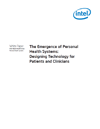
Fortunately, telehealth technologies are evolving to provide both patients and healthcare professionals with real-time, interactive, data-rich health management systems that can engage both patients and their care management teams more fully in the treatment of their conditions. And just as important, research that focuses more clearly on how people interact with technology has led to a more comprehensive and coordinated approach to designing technology systems.
This paper explores the ways in which the next generation of telehealth technology can help satisfy the needs of patients in the years ahead, a time that will be marked by significant growth in the number of people who live with chronic conditions. This technology will be particularly useful in working with the chronically ill because it can be used to create a more integrated approach to patient care through the inclusion of all the key people involved, from the patient and their physician, to their nurse, family caregiver or other healthcare professionals.
Download The Emergence of Personal Health Systems: Designing Technology for Patients and Clinicians White Paper (.pdf, 163 KB).
Download from eHealthNews.EU Portal's mirror: The Emergence of Personal Health Systems: Designing Technology for Patients and Clinicians White Paper (.pdf, 163 KB).
Related news articles:
- Intel's Profile